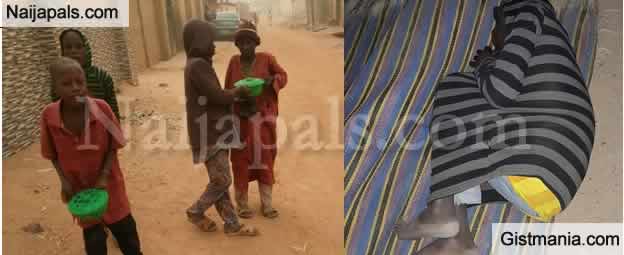
The World Bank disclosed in a new report that the North accounted for 87% of poor people in the whole of Nigeria in 2016.
The report titled ‘Advancing social protection in a dynamic Nigeria’, released on January 28, 2020, was described as a ‘detailed analysis of the social protection sector’ in the country.
The report noted that social protection measures implemented by the government in Nigeria had not been able to address the high level of poverty, as well as the negative impact of conflicts and natural disasters.
In the comprehensive report, obtained by one of our correspondents, the World Bank observed that although Nigeria was a richly endowed country, it had a larger proportion of the world’s extreme poor than any other nation.

The report further noted that most of the poor in Nigeria were found in the Northern part of the country.
The North-West, specifically, was described as home to almost half of all the poor in the country.
Nigeria’s President, Major General Muhammadu Buhari, (retd.), is from Katsina, a state in the North-West, which like other parts of the North, has produced a larger proportion of Nigerian leaders.
Looking at inequality in the country, the report said, “Nigeria experiences high inequality along geographic lines, with poverty mostly concentrated in the North and in rural areas.
“Poverty in the northern regions of the country has been increasing, especially in the North-West zone.
“Almost half of all the poor lived in the North-West and the North accounts for 87 per cent of all the poor in the country in 2016.”
“Poverty rates in the southern zones were around 12 per cent with little variation across zones. The South-South zone saw the most significant drop in poverty from 2011-2016.
“Poverty was significantly higher in rural areas of the country in 2016. An estimated 64 per cent of all poor lived in rural areas and 52 per cent of the rural population lived below the poverty line in 2016. In contrast, the poverty rate in urban areas remained stable at 16 per cent between 2011 and 2016.”
Painting the picture of a relatively prosperous South and an impoverished North, the report stated, “Regionally, the North lags far behind the South in every human capital outcome. People in the Northern regions are also more vulnerable to falling into poverty.
The report established a link between poverty in the North and the Boko Haram insurgency. According to the World Bank, most of the youth recruited by Boko Haram are jobless, a development which made them more prone to radicalisation.
It noted that the activities of the Boko Haram insurgents in the North-East since 2014 had created a sense of ‘failed political promise’.
It added, “Disasters and conflict have displaced many Nigerians, especially in the North-East. According to estimates provided by the International Displacement Monitoring Centre, there were more than two million internally displaced persons in Nigeria as of 31 December 2018.
“In 2018 alone, more than 600,000 Nigerians were displaced due to natural disasters and more than 540,000 were displaced due to conflict and violence.
“In the North-East, the emergence of the militant Islamist group Boko Haram since 2014 has not only caused large scaled displacement, but also several incidences of kidnapping, death, and injuries, and the erosion of social contract due to widespread perception of a failed political promise. Poverty and deprivation have played a central role in fostering a social divide.
“The youth used by Boko Haram to partake in the conflict are jobless, without skills, or trades, and are easily susceptible to radicalisation,” the report said.
The World Bank added that besides conflict, climate related factors had caused additional displacement in the North and the Middle Belt regions of the country.
In 2018, flooding affected 80 per cent of the country and triggered more than 600,000 new displacements.
The report said, “Social protection measures in the country are neither well-suited to respond to conflict, nor well-placed to anticipate and mitigate the risks of natural disasters caused by climate change.”
Weak governance, lack of basic infrastructure, poor quality of education, and poor social service delivery, were identified as some of the reasons for the high level of poverty in Nigeria.
According to the report, “Poverty remains high in Nigeria due to its dire social service delivery outcomes and lack of basic infrastructure.
“Nigeria has the highest number of out-of-school children of primary school age in the world with nine million children out of school.
“There has been little change in vaccination rates over the last 25 years and Nigeria is set to overtake India as the country with most under-five deaths in the world.”
The First Lady, Aisha Buhari, recently raised the alarm over the large number of out-of-school children in the North.
The World Bank added that 71 million Nigerians lack access to improved water, while 130 million people do not meet the Millennium Development Goal standards for sanitation.
However, the situation is worse in the North-East and North-West, where only around 25 to 28 per cent of households have access to basic services such as electricity, water, and sanitation.
The World Bank further observed that number of Nigerians living in extreme poverty went up from 2011 to 2016.
The poor in Nigeria lag far behind the rich in every human capital outcome, according to the World Bank Human Capital Index, where Nigeria ranked among the worst seven performers.
It noted that the rate of poverty in Nigeria increased from 35.0 to 38.8 per cent of the total population from 2011 to 2016.
In the same vein, the report pointed out that, despite Nigeria’s middle-income status, almost four out of 10 citizens lived below the national poverty line in 2016.
Between 2011 and 2016, the total number of people living in poverty increased from 57 million to 74 million, the World Bank added.
Commenting on the report, prominent northerners, including ex-Vice-President Atiku Abubakar; Alhaji Balarabe Musa and Junaid Mohammed, called for emphasis on education and a change in some cultural practices.
We should change culture that militates against poverty alleviation – Junaid
In separate telephone interviews with one of our correspondents in Abuja, on Monday, Mohammed and Musa said successive administrations had failed to reduce poverty largely because they failed to ensure that funds meant for the poor reach the masses.
Mohammed said, “I have no doubt in my mind that while it is important to concentrate on the economics of fighting poverty, it is important also for people to be sincere and confront those aspects of their culture which are counterproductive in the fight against poverty.What needs to be done is for government to be sincere in tackling poverty.
“Sadly, even the pittance that is allocated to poverty alleviation in this country is being stolen by those in power because they know nothing will happen.
“Unless we have the political will to deal with this issue nothing will change. We must have leaders with sincerity of purpose. One of the tragedies of poverty in this part of the country is sadly the reality of some of our cultural practices which today’s reality cannot support.”
Musa said the level of poverty was more in the North because of the poor level of western education.
He stated, “The level of education here is certainly lower that what you have in the South. So, definitely, the level of poverty in the North is higher than that of the South. But if we really decide what is poverty, we will find out the difference between the north and the south is relative in terms of poverty.
“When you are talking of the bourgeois sense of poverty which is restricted to the level of empowerment at the higher level, yes you can say there are poorer people in the north than in the south but if you take Nigeria as a whole, the country as a whole is suffering from poverty that of the north is certainly higher.
“Poverty alleviation programs by successive administrations have failed because they are bourgeois based.”
On his part, Atiku said insecurity, unemployment, lack of skills and lack of education were responsible for the high poverty rate in the North, especially in the North-East and North-West.
Atiku, who spoke through his Media Adviser, Mr Paul Ibe, said businesses would not thrive in an environment that was plagued by insecurity, lack of skills and lack of education.
Atiku said, “It is very clear that the North-East and North-West have a lot of shortcomings when you look at the index of education. So, education is key. It is the fastest vehicle for upward mobility.
“Education is a game-changer. The North -East and North-West are not doing well in that particular sector. That has impacted on the poverty aspect. To move from the threshold where they are now to the next level, there is the need for re-prioritization of education as the most important sector.
The Coalition of Northern Groups attributed the high level of poverty in the North to the failure of current crop of northern elite to realise that grabbing political powers was not enough to lift the people out of poverty.
Spokesman for the group, AbdulAzeez Suleiman, told one of our correspondents that the First Republic leaders from the North were farsighted.
“The Northern elite in the First Republic were far-sighted and focused on promoting a socio-cultural revolution that would have ensured that the North adopted the twin policies of education and entrepreneurship at the grassroots.
“On the other hand, the elite that followed were grabbing political power with single-minded focus. They have failed to ensure that every child either acquires education and thus becomes ‘employable’, or learns a trade and becomes self-employed.
He said the northern leaders should ensure that every child was employable or self-employed through education, vocational training and skill acquisition programs.
| Posted: at | |



 Terrible statistics, numbers and information, but it is important to talk about it, write, shoot stories, you need to know and influence it in every possible way. I have studied various social issues of society,
Terrible statistics, numbers and information, but it is important to talk about it, write, shoot stories, you need to know and influence it in every possible way. I have studied various social issues of society,  TRENDING GISTS
TRENDING GISTS  I'm Building PDP, Not Tearing it Apart - Wike Addresses The Press (Video)
I'm Building PDP, Not Tearing it Apart - Wike Addresses The Press (Video) VIDEO: Man Caught While Waiting For a Minor he Had Solicited S£x From Online
VIDEO: Man Caught While Waiting For a Minor he Had Solicited S£x From Online Emotional Moment Femi Adebayo Presented His 2025 AMVCA Trophies to His Dad, Adebayo Salami
Emotional Moment Femi Adebayo Presented His 2025 AMVCA Trophies to His Dad, Adebayo Salami Rapper, Phyno Unveils His Daughter, Shares Adorable Video to Mark Her Second Birthday
Rapper, Phyno Unveils His Daughter, Shares Adorable Video to Mark Her Second Birthday Ex Madrid Player, Xabi Alonso Seals Managerial Move To Real Madrid As Ancelotti Bows Out
Ex Madrid Player, Xabi Alonso Seals Managerial Move To Real Madrid As Ancelotti Bows Out
 Retired Teacher, Mallam Kabiru Killed, Wife Abducted As Bandits Invade Zamfara School Quarters
Retired Teacher, Mallam Kabiru Killed, Wife Abducted As Bandits Invade Zamfara School Quarters